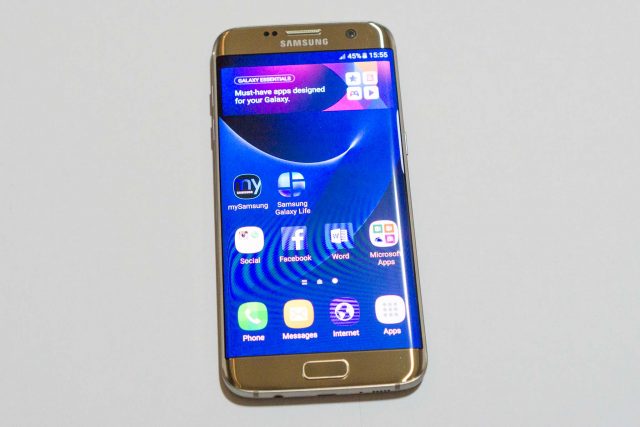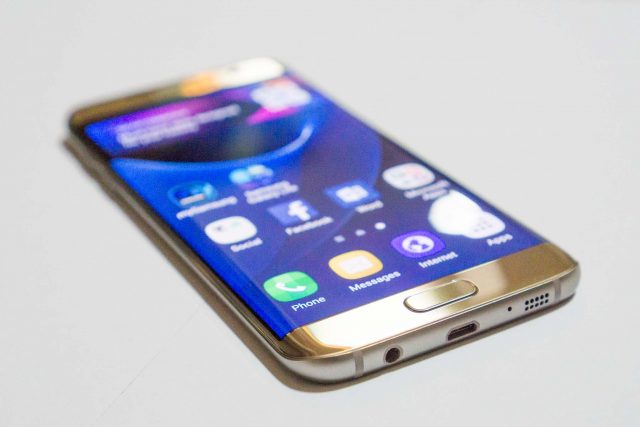For a couple of iterations now, I’ve considered Samsung’s Galaxy flagship devices to be somewhat overpriced and, while certainly having pretty good technical specifications, not truly spectacular nonetheless all things considered. The Samsung Galaxy S7 Edge, however, seems to be a really excellent smartphone, and perhaps the smaller Galaxy S7 sibling too. I’m beginning to like Samsung again.
There’s nothing short of the best to be expected from the Galaxy S7 Edge. It’s Samsung’s latest Galaxy flagship after all, and the one that follow’s their recent trend of display screens that curve around the sides. The display quality is excellent, with really bright and vibrant colours. Samsung has brought back support for storage expansion with microSD cards, and frequent travellers also have the option of adding a second SIM.
Perhaps more impressive is that the Galaxy S7 Edge is now waterproof. Most smartphones that are designed to be waterproof tend to be slightly bulkier. But that’s not the case with the Galaxy S7 Edge. It still measures a svelte 7.9 mm thick.
If a thin phone that’s also waterproof is not impressive enough, consider its 3600 mAh battery capacity. That’s not anywhere near the biggest battery you can get in a smartphone, but it’s certainly well above average, and you’re getting it inside a smartphone that’s just 7.9 mm thick. That’s quite something.
Here’s a quick run-down of the Galaxy S7 Edge hardware specifications. The display is a 5.5-inch Super AMOLED panel with 1440 x 2560 pixel resolution, topped off with Corning Gorilla Glass 4. The main camera is a 12 MP 1/2.6″ sensor with f/1.7 aperture, phase detection autofocus, OIS, and LED flash. The front-facing camera is 5 MP, also with a f/1.7 aperture. There’s 32 GB of internal flash (or 64 GB in some other markets), and 4 GB of RAM. There are two processor variants, either the Snapdragon 820 or Exynos 8890 Octa, and it’s probably the former that we get in Singapore.
In the usual Samsung style, the fingerprint sensor is embedded in the home button on the front. You have the usual LTE, Wi-FI 802.11 a/b/g/n/ac, GPS with A-GPS, GLONASS, NFC, Bluetooth, etc.
The Galaxy S7 Edge has been a joy to use. The software is fluid and responsive, perhaps quite expected given its processing capabilities. The screen is really beautiful. I personally don’t care too much about the curved edges. I find that it’s too easy to accidentally trigger touch input on the display when handling the device. I also find that the thinner edges, resulting from the curved sides, mean that there’s just a little less secure of a grip.
The design, overall, is pleasing to the eye. The build quality is really good, but it somehow doesn’t feel metal enough, even though it does have a metal body. Perhaps it might be due to its relatively light weight, coming in at 157 g. That it’s also pretty lightweight is an added bonus.
I do have an issue with the glass on the back. It’s a fingerprint magnet. It’s the sort of thing that drives me crazy, but I suppose this can be resolved by sticking some decorative decal on the back, or put the phone in a case. Both aren’t necessarily better solutions in my opinion.
The Galaxy S7 Edge doesn’t feel that big, even though it does pack a 5.5-inch display. It’s reasonably comfortable to hold, and I think if you’re looking for a phone with a 5.5-inch display, this is probably one of the smallest bodies that you can get.
I’ve not made detailed comparisons about the camera image quality, but at quick glance it does seem amongst the best that any smartphone can produce. It’s also extremely quick, with very minimal shutter lag. If you take many quick action shots, the Galaxy S7 Edge’s camera won’t disappoint.
This is my short preview of the Galaxy S7 Edge, focused primarily around first impressions. There’s no doubt that the Galaxy S7 Edge’s hardware is excellent. It’s waterproof, packs a large battery, and has just about everything feature you’d expect to have squeezed into a small 7.9 mm thin body. I wished it would be a Nexus device running pure Android software. No, Samsung hasn’t won me over with their software.
I’ll post a full review of the Galaxy S7 Edge in due time!


Hey, Zit Seng, when you post your review, would you mind posting the Androbench flash read/write speed results while FDE is activated? I know that ever since the S6 Samsung has been using UFS memory instead of eMMC, which is great for sustained continuous writes, but even better for small random ones due to the serial bus being full-duplex. The S6’s continuous write speeds were barely above the minimum 50 MiB/s that Google mandates for default FDE, so I’m curious how much better the next generation is, if at all. Thanks!